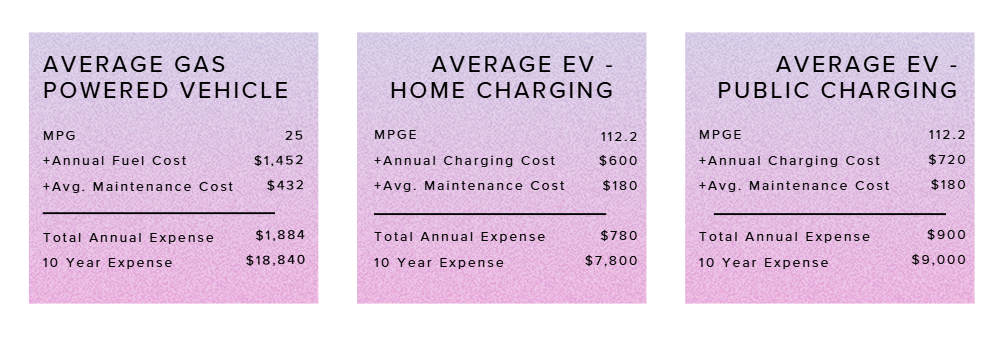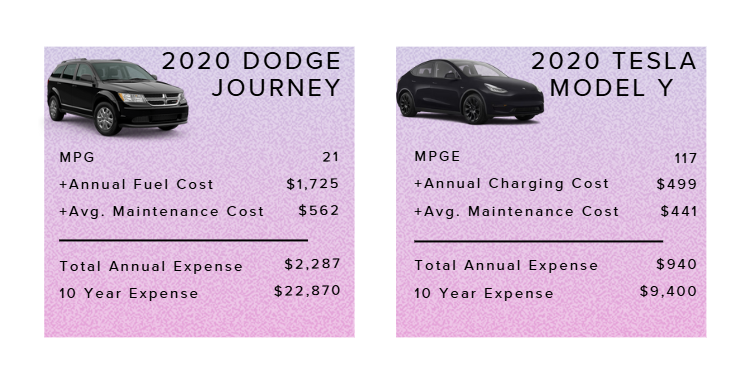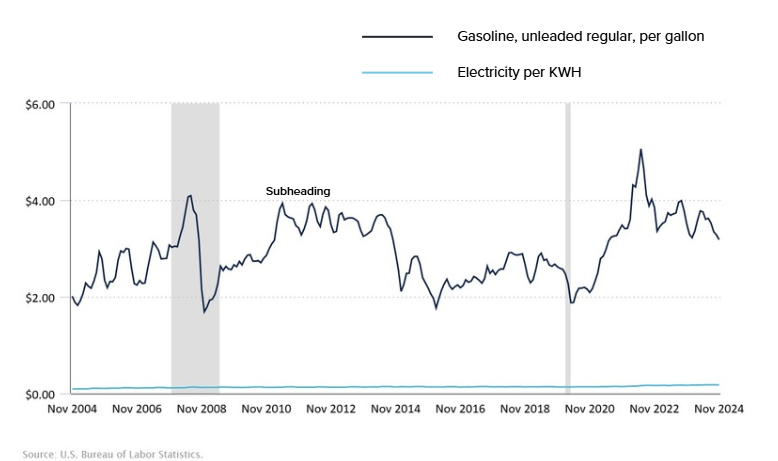Switching to an electric vehicle offers significant savings compared to traditional gasoline-powered cars. Their lower fuel and maintenance costs make them a competitive option. Here’s a closer look at the savings potential:
The current national average price for regular gasoline is approximately $3.02 per gallon (AAA, 2024). AAA's research also indicates that average maintenance costs for gas vehicles are between $330-$600. This includes expenses like oil changes, brake replacements, engine repairs, and other maintenance. For a typical gasoline vehicle that travels 12,000 miles a year, with a fuel efficiency of 25 miles per gallon, the cost per mile comes out to 15.7 cents (including fuel and maintenance costs: fuel at 12.1 cents/mile and average maintenance costs of 3.6 cents/mile).
EVs are much more efficient, consuming about 3.33 miles per kilowatt-hour (miles/kWh). With fewer moving parts than gasoline vehicles, EVs require significantly less maintenance. Maintenance costs for EVs are about 50-70% lower than standard gas vehicles (Consumer Reports, September 2020). The cost to charge depends on where you plug it in.

The graphic above compares the annual price of fueling and maintenance for 12,000 miles a year of a typical gasoline vehicle and of an EV utilizing home charging, and an EV utilizing public charging. Curious about the numbers? Here’s the breakdown:
Home Charging:
Cheaper than public charging
Average residential electricity rate in the United States: 16.62 cents per kWh (Compare Power, 2020).
Cost to charge at home: 6.5 cents per mile, or $1.95 to match the energy equivalent of a gallon of gasoline.
Public Charging:
Faster than home charging, full charge within 18 minutes
Averaging 20 cents per kWh (Electrek, June 2020)
Cost to public charge: 7.5 cents per mile, or $2.25 to match the energy equivalent of a gallon of gasoline.
Example: Tesla Model Y vs. a Gas-Powered SUV
Now that we’ve seen the numbers on average, let’s compare a 2020 Tesla Model Y with a 2020 Dodge Journey to understand their respective fuel and maintenance costs.

Gas Prices vs. Electricity Rates
Switching to an EV isn’t just about financial savings; it’s about predictability and peace of mind. Gasoline prices are prone to fluctuations due to macroeconomics, making it difficult to estimate long-term costs. Electricity, by contrast, offers stability, enabling EV owners to forecast their expenses with confidence. Furthermore, with the cost of long-range EVs now lower than the average conventional gas-powered vehicle (Bloomberg, July 2024), owning an EV has never been a more practical choice.
The U.S. Bureau of Labor and Statistics graph below shows the fluctuation of gas prices in the last 20 years (black line), and the blue line which shows the steady price of electricity. Electricity prices have remained flat over this period of time, while fuel prices have seen a day-to-day fluctuation.

Beyond Fuel Costs: The Comprehensive Benefits of EVs
Electric vehicles offer more than just savings at the pump. With fewer moving parts than gasoline vehicles, EVs require significantly less maintenance. You’ll never need an oil change, or an exhaust system repair—factors that traditionally add up for gas-powered cars over time.
In addition, financial incentives make EVs even more competitive. Federal and state programs provide tax credits and rebates, reducing the upfront costs of EVs and making them more accessible than ever. To learn more about these incentives, check out our blog post, “Your Guide to EV Tax Credits and Rebates.”
Disclaimer:
The U.S. Department of Energy (DOE), Triangle Clean Cities Coalition and the National Renewable Energy Laboratory (NREL) do not endorse any companies or products described on this report and or the Vehicle Cost Calculator. Vehicle prices and specifications change frequently. Not all data have been verified by DOE or NREL, which manages the site. Consult a dealer or vehicle manufacturer before making purchasing decisions.
